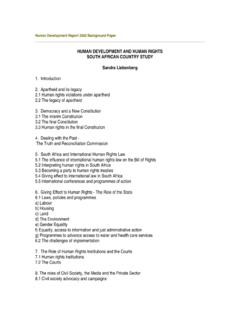Transcription of Tertiary Education Systems and Labour Markets Final - OECD
1 Tertiary Education Systems and Labour Markets Stephen Machin1 and sandra McNally2 A paper commissioned by the Education and Training Policy Division, OECD, for the Thematic Review of Tertiary Education January 2007 The opinions expressed in this paper are the sole responsibility of the authors and do not necessarily reflect those of the OECD or of the governments of its Member countries. 1 Professor of Economics, University College London, Research Director, Centre for Economic Performance, London School of Economics and Director, Centre for the Economics of Education .
2 2 Research Fellow, Centre for Economic Performance, London School of Economics and Deputy Director, Centre for the Economics of Education . 2 Introductory Note This paper was prepared in support of the OECD Education Committee s Activity Thematic Review of Tertiary Education . It was commissioned by the Education and Training Policy Division in the Directorate for Education and it complements the analyses being undertaken by the participating countries and the OECD Secretariat. The objectives of the review are to examine how the organisation, financing and management of Tertiary Education can help countries achieve their economic and social objectives.
3 The focus of the review is primarily upon national policies for Tertiary Education Systems , rather than upon policies and practices at the institutional level. However the management of Tertiary Education institutions will be relevant to the extent that policies to improve institutional management can help to progress national policies. More specifically, the review will: (i) synthesise research-based evidence on the impact of Tertiary Education policies and disseminate this knowledge among participating countries; (ii) identify innovative and successful policy initiatives and practices; (iii) facilitate exchanges of lessons and experiences among countries; and (iv) identify policy options for participating nations.
4 Detailed information about the activity is provided in the following internet site: 3 Executive Summary In recent decades, there has been rapid expansion of Tertiary -level Education across many countries. This report addresses what existing literature can say about the potential consequences of this expansion: Is there now over-supply of graduates? Is there evidence of over-qualification and skill mismatch? Are students studying the right type of subjects at Tertiary -level? Is there a shortage of science and technology graduates in particular?
5 Finally, how does type of institution matter for Labour market prospects? The Labour market consequences of increasing supply can be considered within a simple demand and supply framework. Starting from a position whether the demand for and supply of graduates are equalised, a boost in the supply of graduates should, ceteris paribus, lead to a reduction in the wage premium because employers have a wider range of similarly qualified people to choose from. However, if for whatever reason, employers demand more Tertiary graduates, then there may not be a fall in the wage premium.
6 The wage premium depends on the interaction of demand and supply. In recent decades, there has been a big increase in both the demand for and supply of Tertiary -educated graduates. There is a controversial literature on reasons for the former, but the predominant view is that skill biased technology change is a major contributory factor. In most countries, there has been continued expansion of Tertiary Education in the last decade. However, the wage premium attached to Tertiary Education has increased in most of the countries considered here.
7 The exceptions are Spain and New Zealand two countries with particularly high expansion of Tertiary Education in the last 10 years. Also, in Korea, the wage premium declined markedly between 1974 and 1990, a period of industrialization when there was massive growth in Tertiary Education . However, even in these three countries, there is still a positive return to Tertiary Education . Thus, in no case considered here, can one speak of over-supply of Tertiary Education . The strong, positive and (often) increasing return to Tertiary Education suggests that under-supply is more of an issue and that continued expansion is justified.
8 With regard to employability, in many countries there has been some catch-up of the less educated group over the last decade. However, those with Tertiary Education continue to have a much higher probability of being in employment. On the other hand, it sometimes takes a long time for some (usually less well performing) graduates to find jobs after leaving Tertiary Education and even then, some graduates are not observed in jobs that appear to be well matched to their qualifications. At the same time, shortages in certain sectors are reported.
9 An empirical literature has developed that attempts to measure this, and the (sometimes misused) terms of over- Education and under- Education have emerged. The former arises if an individual holds higher qualifications than required by his/her job whereas the opposite applies for the under-educated . However, statistics of over- Education and under- Education are difficult to interpret as workers are matched to jobs based on a range of characteristics (not just their Education level). Also, apparent mismatch may partly be a temporary phenomenon.
10 The extent to which such problems are seen as temporary varies across studies and countries. One generalization which can be made is that the fact of observing over-qualified individuals in the workforce does not mean that there is over-supply of Tertiary educated graduates. If there were over-supply, relative wages and employment probabilities would fall to the level of their closest substitutes and this has not happened. Indications are that skill mismatch (or inadequate levels of skill) is more of a problem than over-qualification . In some countries there is a need to improve the content and accreditation of vocational qualifications, such that they provide what employers need and are recognized to do so.















